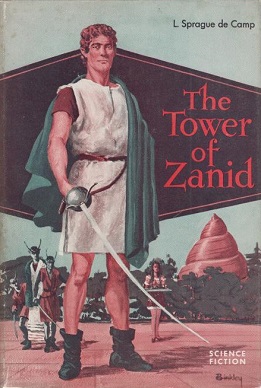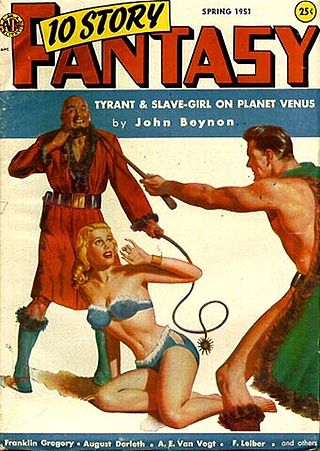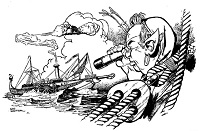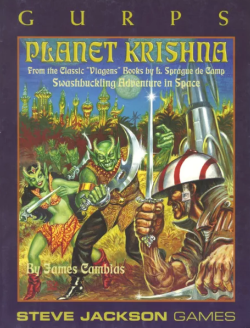Plot summary
The novel is an interplanetary adventure along the lines of de Camp's Krishna series. [2] The protagonist, independent geologist Téraï Laprade, champions the native humanoids of the planet Eldorado against the Interplanetary Metallurgical Bureau (IMB), a predatory conglomerate bent on exterminating them so it can freely plunder their world's mineral wealth. Stella Henderson, daughter of the director of the IMB, arrives on El Dorado disguised as a reporter to gather information portraying the natives in an unfavorable light. She hires Laprade, who has connections among many of the planet's tribes, as her guide.
Their expedition involves them in conflicts with hostile inhabitants of Eldorado, and also in a religious war afflicting the largest state of Keno, where adherents of the bloodthirsty cult of the goddess Beelba seize power. In the course of this, Laprade begins to suspect Stella is not who she says she is, and his native wife Laele dies. Learning the war was provoked by the IMB, he destroys the priests and elevates a friend to the throne of the Keno empire.
After Stella's departure, her report achieves its goal, but she herself is isolated. Meanwhile, Laprade works to prevent the IMB from obtaining an unlimited license for the planet, which will empower it to develop any areas, regardless of the wishes of the inhabitants. He becomes a full-time agent for the Bureau of Xenology, a government agency opposing the IMB, and arms the natives from a large weapons shipment from the planet New England, transported to Eldorado with the help of Captain Flandry. Stella, having escaped custody of the IMB, informs Laprade of the conglomerate's monstrous plans to overthrow the government and exterminate of the Eldoradans. Laprade, at the head of the native army, takes the planet's spaceport, triggering a forty year quarantine of Eldorado that will protect the inhabitants. Stella dies in the conflict, and her realizes he loved her. He finds solace in Sigrid Nielsen, daughter of an old colleague, whom he marries.

François Bordes, also known by the pen name of Francis Carsac, was a French scientist, geologist, archaeologist, and science fiction writer.

The Queen of Zamba is a science fiction novel by American writer L. Sprague de Camp, the first book of his Viagens Interplanetarias series and its subseries of stories set on the fictional planet Krishna. It was written between November 1948 and January 1949 and first published in the magazine Astounding Science Fiction as a two-part serial in the issues for August and September 1949. It was first published in book form as a paperback by Ace Books in 1954 as an "Ace Double" issued back-to-back with Clifford D. Simak's novel Ring Around the Sun. This version was editorially retitled Cosmic Manhunt and introduced a number of textual changes disapproved by the author. The novel was first issued by itself in another paperback edition under the title A Planet Called Krishna, published in England by Compact Books in 1966. A new paperback edition restoring the author's preferred title and text and including the Krishna short story "Perpetual Motion" was published by Dale Books in 1977. This edition was reprinted by Ace Books in 1982 as part of the standard edition of the Krishna novels. The novel has been translated into German, French, Italian, Czech, and Polish. An E-book edition was published by Gollancz's SF Gateway imprint on September 29, 2011 as part of a general release of de Camp's works in electronic form.
"Perpetual Motion" is a science fiction short story by American writer L. Sprague de Camp, part of his Viagens Interplanetarias series. It was first published under the title "Wide-Open Planet" in the magazine Future Combined with Science Fiction Stories in the issue for September–October, 1950. It first appeared in book form under the present title in the collection The Continent Makers and Other Tales of the Viagens, published in hardcover by Twayne Publishers in 1953, and in paperback by Signet Books in 1971. It was also included in the paperback edition of The Queen of Zamba published by Dale Books in 1977. This edition was reprinted by Ace Books in 1982 as part of the standard edition of the Krishna novels. A trade paperback edition in which the story was paired with Richard Wilson's "And Then The Town Took Off" was issued by Armchair Fiction in May, 2013 as Wide-Open Planet & And Then The Town Took Off. The story has been translated into Portuguese, Dutch, and Italian.

The Hand of Zei is a science fiction novel by American writer L. Sprague de Camp, the second book of his Viagens Interplanetarias series and its subseries of stories set on the fictional planet Krishna. The book has a convoluted publication history.

The Hostage of Zir is a science fiction novel by American writer L. Sprague de Camp, the seventh book of his Viagens Interplanetarias series and the fifth of its subseries of stories set on the fictional planet Krishna. Chronologically it is the third Krishna novel. It was first published in hardcover by Berkley/Putnam in 1977, and in paperback by Berkley Books in 1978. A new paperback edition was published by Ace Books in 1982 as part of the standard edition of the Krishna novels. An e-book edition was published by Gollancz's SF Gateway imprint on September 29, 2011 as part of a general release of de Camp's works in electronic form. The novel has also been translated into German and Czech.

The Continent Makers and Other Tales of the Viagens is a 1953 collection of science fiction stories by American writer L. Sprague de Camp, the fifth book in his Viagens Interplanetarias series. It was first published in hardcover by Twayne Publishers, and in paperback by Signet Books in 1971 with a cover by illustrator Bob Pepper. An E-book edition was published by Gollancz's SF Gateway imprint on September 29, 2011 as part of a general release of de Camp's works in electronic form. It has also been translated into Portuguese, Dutch, and Italian. The pieces were originally published between 1949 and 1951 in the magazines Astounding Science-Fiction, Startling Stories, Future Combined with Science Fiction, and Thrilling Wonder Stories.

Antarctic Conquest: the Story of the Ronne Expedition 1946-1948 is a 1949 science book by Norwegian-American Antarctic explorer Finn Ronne and science fiction writer L. Sprague de Camp, published in hardcover by G. P. Putnam's Sons. The role of de Camp, who was commissioned as a ghost writer to recast Ronne's manuscript into publishable form, is uncredited. Ronne's working title was reportedly "Conquering the Antarctic".

Rogue Queen is a science fiction novel by American writer L. Sprague de Camp, the third book in his Viagens Interplanetarias series. It was first published in hardcover by Doubleday in 1951, and in paperback by Dell Books in 1952. A later hardcover edition was issued by The Easton Press in its The Masterpieces of Science Fiction series in 1996; later paperback editions were issued by Ace Books (1965) and Signet Books. A trade paperback edition was issued by Bluejay Books in June 1985. The first British edition was published in paperback by Pinnacle Books in 1954; a British hardcover reprint followed from Remploy in 1974. The novel has been translated into Portuguese, Italian, French and German. An E-book edition was published by Gollancz's SF Gateway imprint on September 29, 2011 as part of a general release of de Camp's works in electronic form.

The Tower of Zanid is a science fiction novel by American writer L. Sprague de Camp, the sixth book of his Viagens Interplanetarias series and the fourth of its subseries of stories set on the fictional planet Krishna. Chronologically it is the seventh Krishna novel. It was first published in the magazine Science Fiction Stories for May 1958. It was first published in book form in hardcover by Avalon Books, also in 1958, and in paperback by Airmont Books in 1963. It has been reissued a number of times since by various publishers. For the later standard edition of Krishna novels it was published together with The Virgin of Zesh in the paperback collection The Virgin of Zesh & The Tower of Zanid by Ace Books in 1983. An E-book edition was published by Gollancz's SF Gateway imprint on September 29, 2011 as part of a general release of de Camp's works in electronic form. The novel has also been translated into Italian and German.

The Continent Makers is a science fiction novella by American writers L. Sprague de Camp, part of his Viagens Interplanetarias series. It was first published in the magazine Thrilling Wonder Stories in the issue for April, 1951. It first appeared in book form in the collection The Continent Makers and Other Tales of the Viagens, published in hardcover by Twayne Publishers in 1953, and in paperback by Signet Books in 1971. It has also been translated into Portuguese, Dutch, and Italian.

The Viagens Interplanetarias series is a sequence of science fiction stories by L. Sprague de Camp, begun in the late 1940s and written under the influence of contemporary space opera and sword and planet stories, particularly Edgar Rice Burroughs's Martian novels. Set in the future in the 21st and 22nd centuries, the series is named for the quasi-public Terran agency portrayed as monopolizing interstellar travel, the Brazilian-dominated Viagens Interplanetarias. It is also known as the Krishna series, as the majority of the stories belong to a sequence set on a fictional planet of that name. While de Camp started out as a science fiction writer and his early reputation was based on his short stories in the genre, the Viagens tales represent his only extended science fiction series.

The Prisoner of Zhamanak is a science fiction novel by American writer L. Sprague de Camp, the eighth book of his Viagens Interplanetarias series and the sixth of its subseries of stories set on the fictional planet Krishna. Chronologically it is the fourth Krishna novel. It was first published in hardcover by Phantasia Press in 1982, and in paperback by Ace Books in April 1983 as part of the standard edition of the Krishna novels. An E-book edition was published by Gollancz's SF Gateway imprint on September 29, 2011 as part of a general release of de Camp's works in electronic form. The novel has also been translated into German.

"Calories" is a science fiction short story by American writer L. Sprague de Camp, part of his Viagens Interplanetarias series. It was first published under the title "Getaway on Krishna" in the magazine Ten Story Fantasy in the issue for Spring 1951. It first appeared in book form under the present title in the collection Sprague de Camp's New Anthology of Science Fiction, published simultaneously in hardcover by Hamilton and in paperback by Panther Books in 1953.

The Swords of Zinjaban is a science fiction novel written by L. Sprague de Camp and Catherine Crook de Camp, the eleventh book of the former's Viagens Interplanetarias series and the eighth of its subseries of stories set on the fictional planet Krishna. Chronologically it is the eighth Krishna novel as well. It was first published in paperback by Baen Books in February 1991. An E-book edition was published by Gollancz's SF Gateway imprint on September 29, 2011 as part of a general release of de Camp's works in electronic form.

The Bones of Zora is a science fiction novel by American writers L. Sprague de Camp and Catherine Crook de Camp, the ninth book of the former's Viagens Interplanetarias series and the seventh of its subseries of stories set on the fictional planet Krishna. Chronologically it is the sixth Krishna novel. It was first published in hardcover by Phantasia Press in 1983, and in paperback by Ace Books in August, 1984 as part of the standard edition of the Krishna novels. An E-book edition was published by Gollancz's SF Gateway imprint on September 29, 2011 as part of a general release of de Camp's works in electronic form. The novel has also been translated into German.

The Venom Trees of Sunga is a science fiction novel by American writer L. Sprague de Camp, the twelfth book in his Viagens Interplanetarias series and the second in its subseries of stories set on the fictional planet Kukulkan. It was first published in paperback by Del Rey Books in November 1992. An E-book edition was published by Gollancz's SF Gateway imprint on September 29, 2011 as part of a general release of de Camp's works in electronic form.

"The Inspector's Teeth" is a science fiction short story by American writer L. Sprague de Camp, part of his Viagens Interplanetarias series. It is the first (chronologically) set on Earth, and a linchpin tale in the sequence, showing how the interstellar political system forming the background of the rest of the series was established. It was first published in the magazine Astounding in the issue for April, 1950. It first appeared in book form in the collection The Continent Makers and Other Tales of the Viagens, published in hardcover by Twayne Publishers in 1953, and in paperback by Signet Books in 1971. It also appeared in The Best of L. Sprague de Camp, and Anthropomorphic Aliens: An Interstellar Anthology. The story has been translated into Portuguese, Dutch, Italian and German.

"The Colorful Character" is a science fiction short story by American writer L. Sprague de Camp, part of his Viagens Interplanetarias series. It was first published in the magazine Thrilling Wonder Stories in the issue for December, 1949. It first appeared in book form in the collection Sprague de Camp's New Anthology of Science Fiction, published simultaneously in hardcover by Hamilton and in paperback by Panther Books in 1953.

"Finished" is a science fiction short story by American writer L. Sprague de Camp, part of his Viagens Interplanetarias series. It was first published in the magazine Astounding Science Fiction in the issue for November, 1949. It first appeared in book form in the collection The Continent Makers and Other Tales of the Viagens, published in hardcover by Twayne Publishers in 1953 and in paperback by Signet Books in November, 1971.

GURPS Planet Krishna is a role-playing game supplement published by Steve Jackson Games (SJG) in 1997 that helps a gamemaster design a GURPS campaign using the Viagens Interplanetarias science fiction setting of L. Sprague de Camp.


















